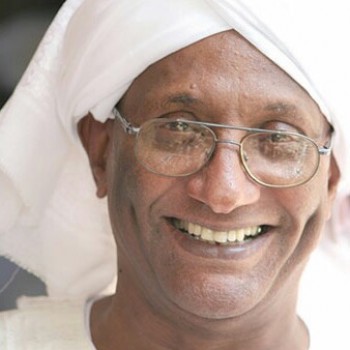Captain Sheikh Al-Din….. Travel Companion

By: Abdullah Ali Ibrahim
It seemed to me that I should hasten to publish this old article to explain the meaning of our professor Abdul Khaleq Mahjoub’s statement that a Marxist must “engage” with religion in order to remove Marxism’s alienation from the historical cultural traditions of Muslims from above an attack on its issues from the platform of thought. I translated “engage” as “engagement” even though I always hoped to find another translation that allowed it. It is based on a simple incident that I saw in the practice of the “Travel Prayer” other than what I had seen before in a modern mood.
An old phrase (February 17, 2013) about Captain Sheikh Al-Din Mohammad Abdullah. It was republished in his memorial , and he left for the abode of survival. O God’s mercy, take the captain on the clouds of the sky, close to the barn of the Lord and His open doors of mercy, so mercy of God be kind upon him, and may God grant patience to his family, his country, and his profession colleques)
Al-Samaowal Khalafallah was kind enough to invite me to a “biography” of singers and poets the day before yesterday, Saturday, to the house of the poet, Minister Abdul Basset Sabdarat, in Jebal Awliya. The biography was merely a fellowship on the bumpy road of creativity. This spirit was evident when we covered the singer’s house, Al-Qalaa, with Kalakla, feeding from a feast, on the occasion of the birth of his first granddaughter. We left the Divan, from the feast to the bus, with prophetic praises for two poets, Moataz Al-Sunni and Ali Al-Busiri. I will never forget the joy that overwhelmed the women of the house. Surprised praise filled the faces, and they chanted, and they took the newborn to the scene listened to the ancient and still sound of a request for blessing.
I sat on both bus trips as a neighbor of Captain Sheikh Al-Din Mohammad Abdullah. Of course, I knew him by hearing about him and God made it possible for me to meet him in this exceptional circumstance. The man has a vitality and preoccupation that has not diminished with age. It is not surprising that attachment to the sky is his profession. I learned from him for the first time how the travel prayer became a tradition on our airlines. I heard it for the first time on an Airbus flight in the mid-seventies, and it seemed to me like a public relations “work” that had no reality in the aviation service itself. After an hour of flight, entering the plane’s bathrooms was no longer a matter of wading. I saw the flight attendants reciting prayers for us, striking against making travel easier for passengers by protecting them from “the troubles of travel and the gloom of the scenery.”
Captain Sheikh Al-Din responded to me from the broad narrowness with his story about the travel supplication by separating the magic of supplication from the stagnation of service. He was the first to broadcast it on the Sudanese plane to the condemnation of his colleagues. He was not motivated to do so by the fact that he was an Islamist who belonged to the Muslim Brothers in elementary school, but rather by another emotion as well. He said that he used to fly pilgrims who were both urgent passengers and elderly people. He noticed that when the plane took off, the rest of them called to pray for the safety of the saints: O Wad Hassouna, O father of evil, O Al-Jaali, O Al-Makashfi, the leader of the people, O Wad Badr, and so on. It occurred to him to unite these conflicting loyalties into a comprehensive loyalty to the Sunnis. So he broadcast to them the prayer of travel: “God is great, God is great, God is great…” When he finished, the flight attendants rushed to him, bringing him the news of the calm that had taken hold of the passengers. So they remained silent, as if birds “were on their heads”. For good words, their journey was made easy for them and ended after that. When the captain learned that the prayer had been prayed for those in his charge in the cabin, he no longer cared about the opposition of his colleagues who thought according to the captain, he would say: Captain so-and-so salutes you. . . We will fly at such and such an altitude and we will reach such and such at such and such an hour.” His critics looked at the modern vehicle, which was culturally neutral at best, and did not get along with his ancient conscience.
The travel prayer was the reason for a professional-personal relationship between the captain, the opposition Islamist, and President Numeiri. He recited the prayer once on the president’s plane, after which he became his designated captain, and that’s another story.



